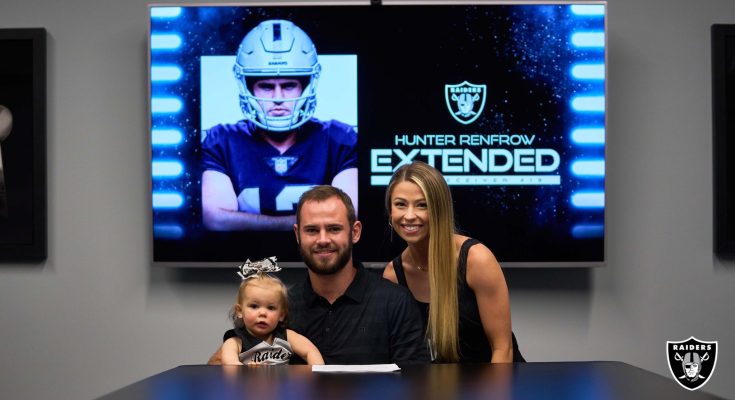Hunter Renfrow’s return to football is more than just another comeback story; it’s a powerful testament to resilience, health, and rediscovered purpose. Once a symbol of reliability on third downs for the Las Vegas Raiders and a beloved Clemson Tigers legend, Renfrow spent the past year fighting a personal battle few fans ever saw coming. Diagnosed with ulcerative colitis—a chronic inflammatory bowel disease that can have debilitating effects—he was forced to step away from the sport he loved. But now, slimmer, healthier, and more determined than ever, Renfrow is back on the field, catching passes once again, and reigniting the passion that once made him one of college football’s most inspiring walk-on stories turned national champion.
When people think of Hunter Renfrow, they remember the unassuming slot receiver with soft hands and deceptive quickness who caught the game-winning touchdown in the 2017 National Championship against Alabama. He wasn’t the biggest, strongest, or fastest player on the field, but he embodied the kind of grit and football IQ that won games. That underdog narrative only deepened during his NFL career, where he carved out a role with the Raiders as a reliable target, especially in high-pressure moments. But while fans and analysts were debating snap counts, fantasy football potential, and offensive schemes, Renfrow was facing something far more serious than a defensive back in tight coverage.
Ulcerative colitis isn’t a condition one simply plays through. It affects the colon and causes long-lasting inflammation and ulcers in the digestive tract. The symptoms—chronic fatigue, severe abdominal pain, cramping, weight loss, and bloody stools—aren’t just physically painful; they’re mentally and emotionally draining. For an athlete whose body is his livelihood, the disease can feel like a slow erasure of everything you’ve built. Renfrow, a player who had made a career out of outworking expectations, suddenly found himself in a fight he couldn’t train his way out of.
His weight loss was alarming. Reports indicate he shed over 30 pounds, which is especially significant for a player already considered undersized by NFL standards. For someone whose game depended on change of direction, sharp footwork, and absorbing contact in tight spaces, losing muscle mass and strength was a major setback. The impact of the disease and its treatment protocols, including immunosuppressive medications and potential dietary restrictions, created a reality where just stepping onto a field seemed uncertain, let alone competing at a professional level. The year away from the NFL wasn’t planned—it was survival mode. He had to step back and reevaluate everything: his body, his health, his future.
But as is often the case with Renfrow, where others might have seen a dead end, he saw a hill to climb. He focused on healing—not just patching things up to return to action but doing the slow, unglamorous work of getting his health right. He worked closely with medical specialists to manage his condition, underwent rigorous physical therapy, and restructured his diet. The aim wasn’t simply to gain back the lost pounds but to return as a more balanced, healthier version of himself. And through it all, the desire to play never left.
In interviews and reports emerging from his return to workouts, Renfrow has expressed not just physical readiness, but a renewed mental clarity. His year off wasn’t just about recovering from ulcerative colitis—it was about rediscovering his love for the game. A player who once said he just wanted to “do his job” on every play found a new appreciation for the craft and community of football. Away from the roar of the crowd and the noise of game plans, he remembered why he loved the game in the first place.
That clarity has been evident in his recent training sessions. Those around him have described a sharper, leaner version of Renfrow—still possessing the elite footwork and quickness that once made him a nightmare in the slot, but now with a renewed edge. There’s a hunger there that goes beyond earning playing time or a roster spot. This is a man who fought to regain control of his body and his life, and every route run now seems imbued with a deeper sense of purpose.
NFL teams have taken notice. While no franchise has officially announced a signing, multiple insiders have reported increased interest in Renfrow as he works out with trainers and quarterbacks in controlled environments. The timing is auspicious. As injuries inevitably mount during training camps and teams assess their receiving corps heading into the preseason, a healthy, motivated veteran with a track record of clutch performances could be exactly what a playoff hopeful needs. And while Renfrow may not be the WR1 type who dazzles with deep balls or breakaway runs, he remains a technician—a route artist with hands coaches trust and a mind that sees the field with clarity.
Beyond the statistics and team fit, though, Renfrow’s return resonates on a much more human level. In a league often obsessed with combine measurables and highlight reels, his story cuts through. It reminds fans that these athletes are not superheroes; they’re people dealing with real-life issues that don’t always show up on the injury report. His battle with ulcerative colitis brings attention to a condition many silently suffer from and shines a light on how chronic illness can intersect with elite athletics in complex, painful ways.
Renfrow also represents a different kind of inspiration than the standard injury comeback. This wasn’t about an ACL tear or a dislocated shoulder. It was about waking up each day feeling depleted, managing a body that was attacking itself, and slowly rebuilding trust in that same body. It was about stepping away not because he wanted to, but because he had to—and then making the conscious, disciplined choice to return. That sort of comeback doesn’t come with viral highlight clips, but its impact is just as real.
The support Renfrow has received from the Clemson community and his former teammates has also been significant. Dabo Swinney, his former college coach, has always spoken highly of Renfrow’s toughness and character. Swinney has reportedly been in contact with Renfrow throughout his recovery, and the Clemson fanbase has remained fiercely loyal, often flooding social media with encouragement and well-wishes. If there’s any doubt about how respected he is, just look at how teammates from past and present react to his return—it’s genuine excitement.
There’s also a strong sense that Renfrow’s journey will influence how NFL franchises view player wellness. More teams are beginning to realize that success isn’t just about athletic performance but holistic health—mental, emotional, and physical. Renfrow’s transparency about his condition and the patience he showed during his hiatus might encourage other players dealing with chronic illnesses or mental health struggles to seek help and take time off without fear of being forgotten or labeled as soft.
As training camps continue across the league, it’s only a matter of time before Renfrow signs with a team. His familiarity with pro-level offenses, calm demeanor in high-stress moments, and strong locker room presence make him an easy fit. He may not be the flashiest addition on paper, but he’s the kind of player who makes a difference when it matters most—on third-and-five, on a cold December night, with the game on the line. That’s when Hunter Renfrow has always thrived.
Whether he returns to a familiar environment like the Raiders or finds a new home, what’s clear is that Renfrow’s story is already a victory. He’s not just back to play football. He’s back to tell a different kind of story—one about the intersection of health, purpose, and perseverance. And in a sport that often glorifies power and speed, his is a reminder of the quieter virtues: patience, discipline, and resilience.
There are still questions to be answered. How will his body hold up over a full season? Can he regain the same level of production he once had? Will he need to manage his condition in-season with new routines, medications, or dietary changes? But those are challenges he seems fully prepared for. The fact that he’s back at all—and competing—is already a triumph.
For fans of Clemson, for those who watched him rise from walk-on to national champion, and for anyone who appreciates a good comeback story that touches on real human struggle, Hunter Renfrow’s return is more than just news. It’s a moment worth celebrating. The football world may soon witness a player not just looking to make catches, but to make a statement—about perseverance, health, and the enduring love of the game.



